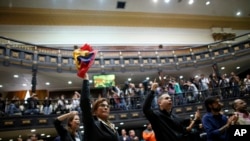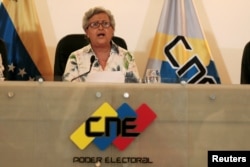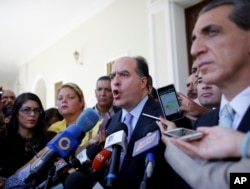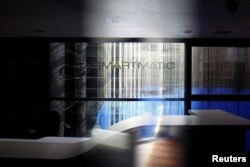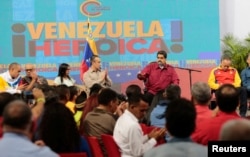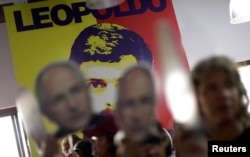Venezuela's president and election chief on Wednesday denied a report that voter turnout numbers were “manipulated” and inflated by at least one million for the controversial election to choose an assembly to rewrite the national constitution.
The head of the National Election Council, Tibisay Lucena, said the claim by a British election-technology firm was “irresponsible,” and she threatened to begin legal action against the company.
“This is an unprecedented opinion from a firm whose only role in the electoral process is to provide certain services and technical support that has no bearing on the results,” Lucena said.
The head of British firm Smartmatic, Antonio Mugica, said in London Wednesday there is no question in his mind that the total reported vote was false. He did not, however, say whether vote tampering altered the outcome of Sunday's balloting.
“Based on the robustness of our system, we know without any doubt that the turnout of the recent election for a National Constituent Assembly was manipulated,” Mugica said. “We estimate the difference between the actual participation and the one announced by authorities was at least one million.”
President Nicolas Maduro said in televised remarks that Mugica was pressured by the United States and Britain. He also repeated the government's stance that eight million people voted, adding that the turnout would have been 10 million if others had not been blocked by protesters.
“This election cannot be stained by anyone, because it was a transparent vote,” Maduro said.
The opposition, which boycotted the vote, said turnout was less than four million, and that account was reinforced by journalists' reports that dozens of polling places around Caracas were almost deserted on Sunday.
The president of the opposition-controlled National Assembly, Julio Borges, said Smartmatic's findings are "complete confirmation" of what the opposition and election analysts had suspected.
Pre-election polls showed more than 70 percent of all Venezuelans opposed a body to change the constitution.
The opposition contends the vote was rigged to pack the assembly with supporters of Maduro. Maduro's opponents are demanding early presidential elections. The next scheduled election is October, 2018.
Lawmakers seek investigation
Borges said lawmakers will ask the country's top prosecutor to investigate members of the National Election Council for potential crimes.
Luisa Ortega Diaz, Venezuela's top law enforcement official and a Maduro critic, told CNN in an interview Wednesday that she has opened an investigation into the allegations of vote manipulation.
Despite the controversy surrounding voter turnout and the final results, Maduro plans to swear in the 545 members of the new “constituent assembly” so they can get to work. He originally set Thursday for the assembly's opening session, but late Wednesday announced the new body would begin its inaugural session on Friday instead, for the sake of “peace and calm.”
“It has been proposed,” Maduro said at a ceremony for the new assembly members in the capital, “that the installation of the National Constituent Assembly, instead of being held tomorrow, be organized in peace and calm, with all necessary protocol, on Friday at 11 a.m.”
Details on what might be included in a new constitution are unclear. Maduro has said it is the only way to pull Venezuela out of its severe economic crisis and stop the daily protests that have killed more than 120 people since April.
But the opposition says its goal is to dissolve the opposition-controlled national assembly, fire anyone who disagrees with the government, and turn Venezuela into a socialist dictatorship.
The United States, Canada, European Union, and nearly every Latin American nation have said they will not recognize the constituent assembly.
The United States imposed sanctions against Maduro on Monday for what it called his “illegitimate” election of a body to rewrite the constitution. All of Maduro's assets in the United States are frozen and Americans are forbidden from doing any business with him.
Maduro raged on television that he does not care.
“They don't intimidate me. The threats and sanctions of the empire don't intimidate me for a moment ... Bring on more sanctions, Donald Trump.”
“We've seen the completion of Venezuela's collapse into dictatorship,” U.S. Vice President Mike Pence said during a visit to Montenegro Wednesday. “The United States calls on all who cherish freedom to condemn the Maduro regime for its abuse of power and its abuse of its own people.”
Pence reminded Maduro the U.S. position that he is “personally responsible” for the health and safety of opposition leaders Leopoldo Lopez and Antonio Ledezma, who were dragged out of their homes in the middle of the night earlier this week and taken to military prison.
The Supreme Court accuses the two of breaking the terms of their house arrest for previous opposition activities and planning to flee the country. Lopez' lawyer denies the charges.
The drop in global energy prices and political corruption have destroyed Venezuela's oil-rich economy. Gasoline, medicine and such basic staples as cooking oil, flour and sugar are scarce, and many Venezuelans cross into neighboring Colombia and Brazil to buy food.
Mauro has blamed the country's woes on what he calls U.S. imperialism and its supporters inside Venezuela. He has warned against intervention by the Organization of American States, saying that would surely lead to civil war.




